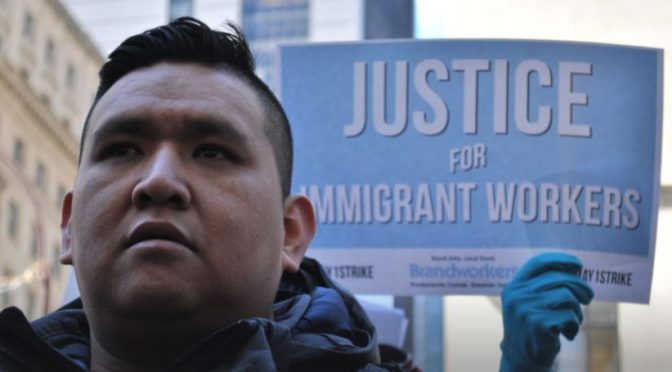This article was originally featured at the Indypendent.
By Astha Rajvanshi
Workers at Tom Cat Bakery start kneading the day’s first loaves inside a Queens factory at 6 a.m. Soon after, the industrial-scale bakery begins delivering 400 varieties of baked goods to hotels, supermarkets, food chains and Starbucks locations across New York City.
One of the bakers, Sabino Milian, a 40-year-old Guatemalan native, came to New York 17 years ago looking for work. Hurricane Mitch struck Milian’s hometown in 1998, leaving his parents helpless and vulnerable. He needed to support them financially. New York presented a land of opportunities, Milian told The Indypendent through a Spanish interpreter. He began working for Tom Cat in 2006 and never had any problems with his bosses.
In March, however, a manager called Milian into his office and told him the company was subject to an ongoing audit by the Department of Homeland Security (DHS) and Immigration and Customs Enforcement (ICE). Milian, along with 30 other workers, were given 10 days to prove they possessed proper documentation to legally work in the country. If they failed to do so, they would be fired.
What stung most of all, Milian said, was Tom Cat’s unwillingness to support its workers. Each employee was offered one week’s severance pay for every year they worked at the company. When Milian and others refused the initial offer, the company became less willing negotiate.
“There was no support or open dialogue,” said Milian. At no point had he foreseen or anticipated the firing. “We all worked so hard and did nothing wrong.”
Tom Cat’s fired employees joined up with Brandworkers, a nonprofit advocacy group for food-manufacturing workers. Negotiating on their behalf, Brandworkers won an extension on the deadline Tom Cat originally set to provide work papers. Now, they are pressuring the company to increase its severance offer. A support fund for the workers has raised over $28,000 in donations so far.
“Some workers have been working there for over two decades and they only had 10 days to show their official documentation,” said Brandworkers’ Cynthia Chavez. “Tom Cat did not give their workers respect, after the workers have given their lives to the company. There is a lot of fear in our communities that there’s a lot of deportation everywhere,” she said. “These workers are the first group of workers who are immigrants and have decided to fight back against the [Trump] administration.”
On April 21, their final day of work, the Tom Cat employees and their supporters held a “Day Without Bread” rally outside the bakery. Four of the fired employees were arrested for chaining themselves to the company’s delivery trucks.
Though initially operated out of a garage by its founder, baker Noel Labat-Comess, Tom Cat has grown well beyond its humble beginnings 30 years ago. It employs over 100 people, many of them Hispanic immigrants, and was acquired last year by Yamazaki, the largest baked-goods company in Japan.
A spokesperson for Tom Cat told the New York Times that the company first learned about the audit in December and later offered to assist the 31 workers it fired with immigration counsel. Some workers believe management is being throttled by ICE and DHS while others question if the company intended to give those workers such short notice all along.
The Tom Cat workers have vowed to continue to pressure the company and, as The Indy went to press, planned to join citywide demonstrations for worker and immigrant rights taking place on May 1.
Under Donald Trump’s administration, Milian said immigrant worker freedoms are under serious threat. “The new administration is criminalizing Hispanics. It is asking immigrants to think twice before coming here.”
Jonathan Rodriguez, who was also fired by Tom Cat, added: “Before Trump, those who did the right thing and worked hard in their jobs could stay. Now, even that’s not enough.”
Listen to journalist Astha Rajvanshi read her article as published in the May issue of The Indypendent on Itunes and Soundcloud.
This episode is part of a the new Indy Audio podcast, where you can listen to the articles from The Indypendent!



